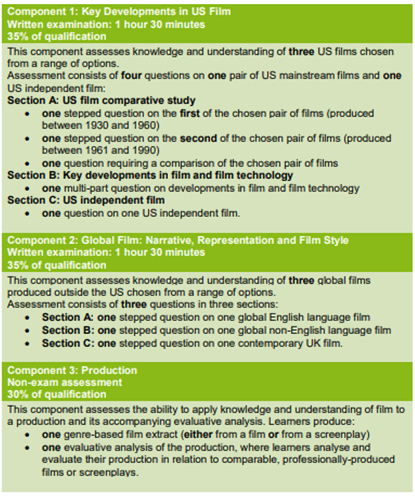Film Studies
Film is an important part of many people’s lives. Those who choose to study it characteristically bring with them a huge enthusiasm and excitement for film which constantly motivates them in their studies. They experience a powerful medium which inspires a range of responses from the emotional to the reflective as they are drawn into characters, their narratives and the issues films raise. The root of that power is the immersive audio-visual experience film offers – one which can exploit striking cinematography, composition and locations as well as powerful music and sound. It is not surprising that many consider film to be the major art form of the last hundred years and that many feel it important to study a medium which has such a significant influence on the way people think and feel.
The WJEC Eduqas specification in GCSE Film Studies is designed to draw on learners’ enthusiasm for film and introduce them to a wide variety of cinematic experiences through films which have been important in the development of film and film technology. Learners will develop their knowledge of US mainstream film by studying one film from the 1950s and one film from the later 70s and 80s, thus looking at two stages in Hollywood’s development. In addition, they will be studying more recent films – a US independent film as well as films from Europe, including the UK, South Africa and Australia.
Production is an important part of this specification and is integral to learners’ study of film. Studying a diverse range of films from several different contexts is designed to give learners the opportunity to apply their knowledge and understanding of how films are constructed to their own filmmaking and screenwriting. This is intended to support learners in producing creative films and screenplays as well as enable their production work to provide an informed filmmaker’s perspective on their own study of film. The academic study of film is now well established and the frameworks for its study are broadly similar whether at GCSE, AS, A level or at higher education institutions.
The WJEC Eduqas specification in GCSE Film Studies aims to develop knowledge and understanding of:
- The ways in which meanings and responses are generated through film.
- A contrasting, culturally diverse range of films from different national contexts.
- Film as an aesthetic medium.
- How films reflect the social, cultural and political contexts in which they are made.
- The relationship between film and film technology over time.
In addition, the specification aims to enable learners to apply their knowledge and understanding of film to film making or screenwriting.
An overview of the assessment is as follows:

Overview of the course:
| Year 1 | |||
| Component 1 | Component 2 | Component 3 | |
| Autumn | An Introduction to the timeline around the history of film | The Film Form. A study around the elements of film. | How to develop a script and an Introduction to the Coursework component. |
| Spring | ‘Hurtlocker’ case study and linking this to Tara McKelvey’s specialist writing. | ‘Skyfall’ Case Study and Cinematography | Coursework to be started. How to complete a storyboard. |
| Summer | ‘Grease’ and America in the 1980’s | ‘Let the Right One In’ Case Study | Evaluation and how you evaluate your coursework |
| Year 2 | |||
| Component 1 | Component 2 | Component 3 | |
| Autumn | ‘Singing in the Rain’ and America in the 1950’s | ‘Let the Right One In’ Representation | All first drafts of coursework should be completed. This will be marked and updated across the year in order to achieve the best marks possible. Final drafts |
| Spring | Comparison of ‘Grease’ and ‘Singing In the Rain’. Film timeline of the key moments across film industry | ‘District 9’ and Narrative Theory applied. | |
| Summer | ‘Hurtlocker’ ‘Grease’ ‘Singing in the Rain’ Exam responses and how to approach the exam. | ‘Skyfall’ and cinematography explored with the key scenes |



